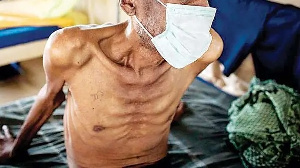Mr Bismark Sarpong, TB Coordinator at the Direct Observed Treatments (DOTs), Pokuase Health Centre has expressed worry about the failure of TB patients not successfully completing their treatments.
Mr Sarpong said most patients stopped treatment two weeks after they had begun treatment even though the treatment journey was for six months as efforts to trace them to continue with their treatment had proved futile.
He said: “When they are diagnosed with TB disease, they come for treatment for the first two weeks and stop coming afterwards when they realise that they are no longer coughing. They assume that they have been cured but if you don’t continue taking the medication, you will relapse and you will come back with other complains”.
The TB Coordinator spoke to the Ghana News Agency at the Commemoration of World TB Day, organised by the Ga North Municipal Health Directorate under the global theme: “Yes! We can end TB”.
Tuberculosis is an infectious airborne disease caused by the mycrobacterium Tuberculosis and transmitted through sneezing, coughing, and spitting of an infected person.
Globally, a total of 1.6 million people died from TB in 2021 (including 187 000 people with HIV).
According to the World Health Organisation (WHO), TB is the 13th leading cause of death and the second leading infectious killer after COVID-19.
“Despite the dangers and high rate of infection, a lot of people in Ghana fail to avail themselves due to myths and stigmatization, particularly patients diagnosed of the disease,” he added.
Madam Evelyn Yaro, Municipal TB Coordinator for Ga North Municipal Assembly, said the district failed to achieve its target in the year 2022.
She said the municipality had 56 suspected TB cases instead of the 65 targeted per 100,000 people by the WHO.
She noted that some of the situations were due to stigmatization and myths associated with the disease and called for more public education to demystify such situations.
Dr Maame Yaa Essel, Municipal Health Director, Ga North Municipal Health Directorate said increasing awareness among the public and stopping stigma would help affected persons avail themselves for treatment.
She told the GNA that TB cases dropped in the year 2020 because they were afraid of contracting covid-19 at the hospital.
She said: ” We see a decline of cases over the years, but we saw a dip particularly the year 2020 because of covid-19. We were not getting cases because there was no attendance and our screening also dropped”.
She said the health sector had not met full recovery of TB and HIV due to the shift in attention to the outbreaks of covid-19, monkeypox, Polio and the outbreak of Marburg virus and said the commemoration of World TB Day was necessary to raise awareness among the public that the disease still existed, hence the need for protection and testing when necessary.
Source: GNA
 Home Of Ghana News Ghana News, Entertainment And More
Home Of Ghana News Ghana News, Entertainment And More





